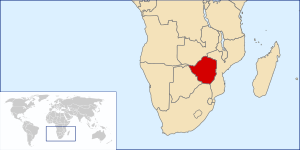| Total population | |
|---|---|
| Greeks 3,000 | |
| Regions with significant populations | |
| Harare, Bulawayo | |
| Languages | |
| Religion | |
| Predominantly Greek Orthodox |

The Greeks in Zimbabwe comprise about 3,000 people of Greek origin, with over half of them from the island of Cyprus.[1] The Holy Archdiocese of Zimbabwe and Southern Africa is under the jurisdiction of the Patriarchate of Alexandria.[1] Hellenic Academy, an independent Greek high school was established in Harare in 2008 and continues to operate.[1] Zimbabwe also hosts several Greek Orthodox churches as well as Greek associations and humanitarian organizations.
Most of the Greek community are to be found in Harare, and to a lesser extent Bulawayo, Gweru, and Kwekwe. Many Greek Zimbabweans maintain their identity through the observation of Greek customs and traditions, and their adherence to their Greek Orthodox Christian faith, whilst also participating in Zimbabwean society.[2] The number of people reporting their ethnicity as Greek in Zimbabwe was over 3,000 in the 2012 census. An estimated 30,000 to 45,000 people have Greek ancestry, a majority of whom now reside abroad.[3]
In the modern era, many Greeks came by way of Cyprus, Greece and to a lesser extent South Africa, the Congo and Egypt to Zimbabwe, coming in waves from the 1950s to the early 1970s. The vast majority of these migrants came to Harare, which still feature noticeable Hellenic heritage with churches, restaurants, small businesses, and social clubs. Suburbs that became Greek hubs during this era include Milton Park, Greendale, Newlands, Highlands, and Eastlea, the latter where the Hellenic Club of Harare is based.[4]
- ^ a b c Cultural Relations and Greek Community Ministry of Foreign Affairs (Greece)
- ^ Mlambo, Alois (2000). ""Some Are More White Than Others": Racial Chauvinism as a Factor of Rhodesian Immigration Policy, 1890-1963".
- ^ "Uncovering 'undesirable whites' in the colonial archive".
- ^ Mlambo, Alois S. (2013). "Becoming Zimbabwe or Becoming Zimbabwean: Identity, Nationalism and State-building". Africa Spectrum. 48: 49–70. doi:10.1177/000203971304800103. hdl:2263/41913. S2CID 127302759.
